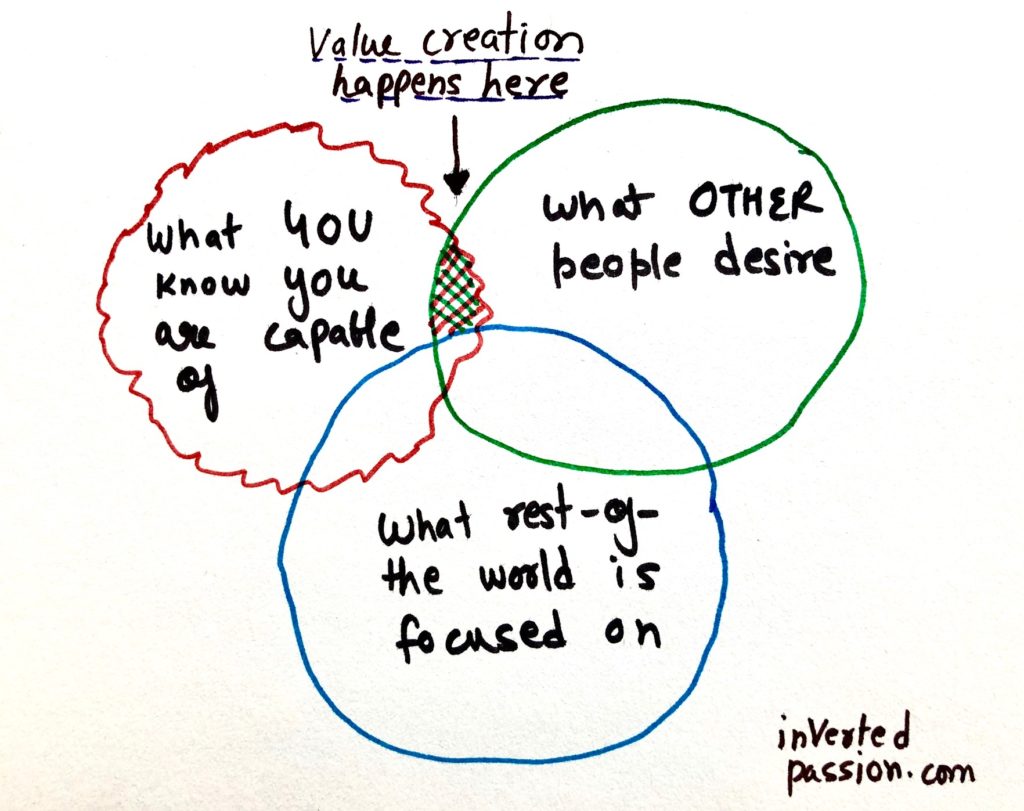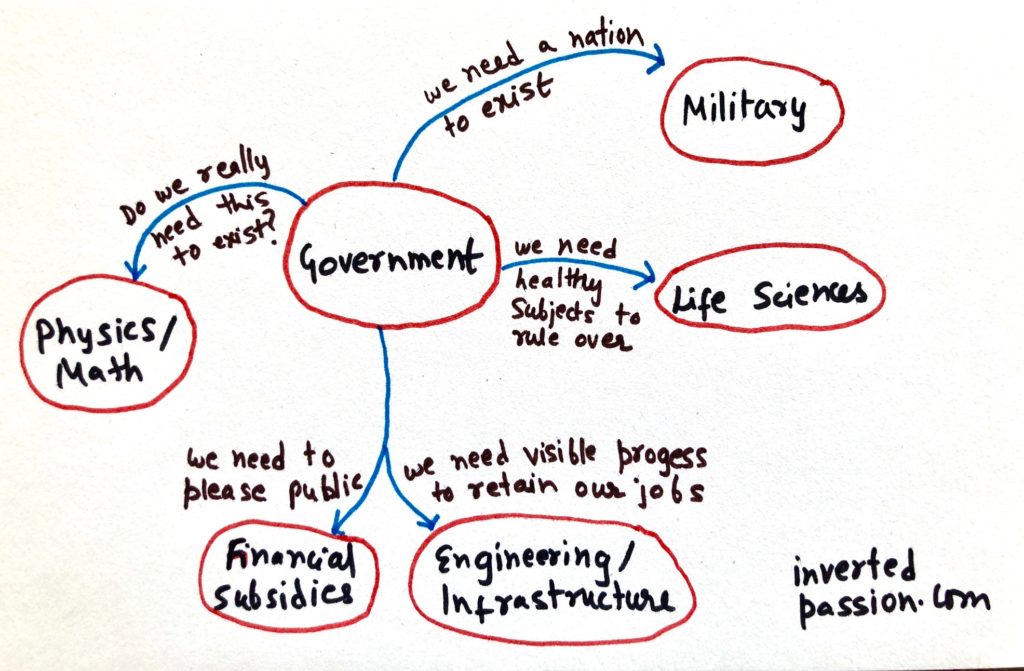Post-docs (people with PhDs who aren’t professors yet) get an average of $52k of salary per year. Librarians and postal service works get $55k and $57k respectively. I came across these figures on an angry blog post where the author concluded:
The hard truth is academic postdocs are not valuable.
Why are intelligent people who’ve spent five or more years making an original contribution to the world (PhDs) paid less than people who’ve done short vocational training (librarians, mailmen)?
Scientists are selfish
Scientists are paid less because they’re doing it for their own pleasure. The topics they choose to work on are the ones that they’re most passionate about. But markets don’t pay people for indulging – in fact, there’s a cost for indulgence. Academics pay that cost by losing on the money they could have gotten in the industry. And, in industry, they seldom chose to select their topic of interest. There’s no free lunch!
It’s different for librarians and mailmen because they make fulfill someone else’s needs and the market pays them for that. This website is called Inverted Passion because value creation starts with finding out what others are passionate about and then adapting yourself to service their needs and desires. To create value, passion usually needs to be inverted.

Science is a positive externality
Externalities are (beneficial or harmful) consequences that happen to someone was not part of a transaction. An example of negative externality is pollution. If making soap increases a firm’s profit but pollutes water, it typically continues doing that. Health impact on the public is an externality. Such negative externalities could remain unchecked for a long period of time because no single individual is harmed directly and immediately. Pollution kills slowly so nobody is incentivized to invest time and money to get the factory to shut down. In such cases, government regulation (in terms of pollution tax or shutdown notices) is required.
Science in a similar way helps the humanity collectively. A knowledge published in a research paper belongs to everyone. Because it’s beneficial, it’s a positive externality. But the market doesn’t value it because detection of the first interstellar object in our solar system does little to change how an average human goes about his/her life daily. This is why governments step in to fund science. However, that comes with a host of problems.
The amount of science funding is not enough
Talking about scientists and mailmen, in 2015 the revenue of United States Postal Service was $68 Bn while the total funding for science made available by US government was $30 Bn. Let that sink in. The money flowing through the mail industry in US was more than twice the money flowing from government to science.
The lesson for profit seeking entrepreneurs is to let go of their passion and instead seek what other people value. It sounds obvious but our inside-out view muddles thinking and we mistakenly start thinking other people have a need for something we’re building out of passion. (Psychologists call it the mind-projection fallacy) I’ve made that mistake several times in my career. I let my passion guide me and I built things that nobody wanted.
Government spends in areas where it’s incentivized to do so
In 2015, the US government spent $600 Bn on military while it spent 1/20th of that on science. In fact, for some politicians this $30bn might be too much. Quoting from the Scientific American:
Some members of the new Congress have already vowed to cut all nonmilitary R&D.
It’s important to note that governments do not spend evenly across scientific disciplines. Life sciences, engineering and environmental sciences get most of the funding while physics, mathematics and psychology get much less. (And if you’re doing research in social sciences, good luck to you).
This uneven distribution of funding happens because governments are incentivized to show progress in metrics that the majority of humans care about – that is things that about what immediately benefits him/her in the short term. Scientific disciplines that have indirect or long term benefits lose out. The verification of Higgs Boson will not help the government get re-elected, so it doesn’t (easily) allocate funds towards that. However, because government officials must protect their jobs, they must have a nation that funds them so it easily approves of thousands of military research projects.

Limited funding = hunger games in academia
The academia is not a utopia. Being a professor is grueling. The professor has to write research proposals, beg for grants and navigate a highly political environment. To understand why academia is political, first, let’s note that it is a non-market environment. In a (capitalistic) market, money measures the amount of value created. But academia is structured differently and because market does not reward professors and academics with big money, they start measuring themselves by the number of papers published and the number of citations those papers get. (Some kind of a status metric always emerges in any group of humans. It’s how we’re wired).
Free economies are transparent because money is the proxy of value creation, and typically an entrepreneur doesn’t need anyone’s permission to engage in a transaction. In fact, free markets allow young entrepreneurs to legally and unapologetically collect billions of status points (dollars). However, in academia, because there’s much less transparency, all sorts of opportunities for political behavior emerge and take hold. For example, opinions of older scientists are revered to the extent of suppressing newer ideas for decades. Women get less citations that men. The structure of academia requires a good scientist to not just do good work but also please other people. (Did I mention already that there’s no free lunch?)
It’s all about incentives, stupid
A surprising outcome of incentivizing scientists to publish more is actually bad science. The system rewards research groups to engage in low risk, low effort who produce low quality but guaranteed results. The pressure is so intense that some scientists have gone far enough to fudge results to get a shot at publication in a good journal. This pressure to publish discourages careful, honest scientists who want to work on high-risk projects that may or may not give results in a short period of time.
There’s a lesson here for anyone who wants to get rich and famous: the world allows you to get rich and famous if you’re helping them succeed in their respective systems.. For example, venture capitalists (VCs) do not get paid when a company makes money, so they do not look out for profitable, healthy businesses. Their incentives are aligned with an increase in share price, so they look for businesses that they’re confident can get the next round of funding. Seed stage investors look for whether the startup can get to series A; series A investors look for whether the company can raise series B; late stage investors look for whether the business can IPO (and by that time, everyone is vested enough to get something out of the business so metrics are jacked up and IPOs are timed. Ultimately retail investors bear the cost). This explains why “healthy” and profitable small businesses are unattractive to VCs – there simply isn’t a chance such business could IPO one day. To get VC funding, an entrepreneur must create value for VCs (and that may not align with creating value for customers).
But that doesn’t make such small businesses worthless. In fact, most businesses are good ol’ ones. They make something that other people desire and charge for it.
Remember: ask scientists and they’ll tell you how nobody pays for your passion. Ask mailmen and they’ll tell you how they like being in service to others.
How would YOU make science more attractive to public?
Now that you’ve read the article, I have a related question for you.
Science benefits humanity, yet governments spend more on bombs and wars.
How could YOU make science more popular among masses so that there’s more funding available for it?
I’ll RT interesting proposals.
— Paras Chopra (@paraschopra) December 19, 2017
What changes in the system will make people pay more attention to science? Tweet your response to me as a reply to this thread and I’ll retweet the most interesting responses. In the same thread, you can also check out and comment on what others proposed.
Join 200k followers
Follow @paraschopra